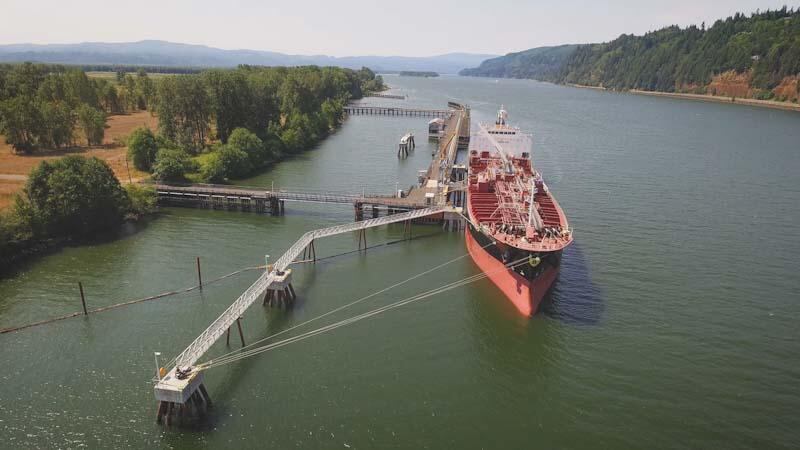Chris Efird, the Texas financier who is trying to build the country’s largest nonconventional diesel refinery on the Columbia River near Clatskanie, told port commissioners this week he has listed 10 companies on big stock exchanges.
“I put seven companies on Nasdaq and three on the New York Stock Exchange,” Efird told commissioners for the Port of Columbia County on Wednesday.
Efird brought up his track record in response to questions about Next Renewable Fuels’ plans to merge with a publicly traded shell company called Industrial Tech Acquisitions II Inc. Merging with a shell is a way to get listed on an exchange without the time and expense of an initial public offering.
Being listed lets a company sell shares to the public to raise money and allows company insiders to sell their shares for a profit. Being listed on the Nasdaq or NYSE gives companies credibility and access to more capital. Shares of Industrial Tech Acquisitions trade on the Nasdaq. Next expects the merger to close next year.
Commissioners didn’t ask for names of the companies that Efird has listed. Mike Hinrichs, a spokesman for Next, didn’t return email or text messages asking what the companies were. Before Next, Efird spent much of his career funding small companies through shell transactions like the one Next is doing.
Efird said his job at Next is to build the team and raise the cash needed to build a multibillion-dollar diesel refinery at Port Westward, a deep-water port just north of Clatskanie. The plant would produce nonconventional diesel, distilled from nonpetroleum sources like soybean oil and used cooking oil.
Efird has said the plant would use large amounts of waste from fish canneries, too. Fish are rich in the long-chain fats that can be turned into nonconventional diesel. Next and others refer to their product as “renewable diesel.” Environmentalists eschew that term because making the fuel requires adding hydrogen to make it compatible with petroleum-based diesel, and the hydrogen often comes from fracked natural gas.
Going public means disclosing more information to the U.S. Securities and Exchange Commission. After its announcement, Next filed an investor presentation with the SEC that showed potential sources of raw material to feed its refinery. Soybean oil made up 63% of it. Used cooking oil made up 5%. Fish waste wasn’t listed.
Refiners of nonconventional diesel prefer waste products like used cooking oil because they have a lower carbon intensity rating than virgin products, and they get more credits, which refiners can sell for cash, for using them.
“It’s a knife fight for feedstock in the market right now,” Efird said at the port meeting.
Efird testified just before the board voted on a land-use hurdle for Next. The company wants to build a yard to park hundreds of rail cars near the proposed plant. To do so, Next needs Columbia County to rezone several hundred acres of farmland for industrial use. Port managers have tried three times to rezone the land—for Next and for other projects—and they have failed each time.
In a victory for Next, the board on Wednesday voted to try again, authorizing port managers to hire new lawyers and go back to the Oregon Land Use Board of Appeals for another opinion.
Opponents of the Next refinery said the move was a waste of money.
“Today’s highly unusual decision by three Port of Columbia County commissioners to spend roughly $400,000 of public funds to attempt to industrialize hundreds of acres of high-value farmland at Port Westward defies reason,” Dan Serres, conservation director of Columbia Riverkeeper, said in a statement. “The port keeps trying to force the same square peg into the same round hole, at enormous expense to the public.”
